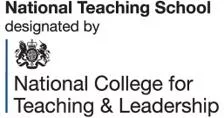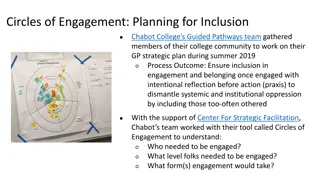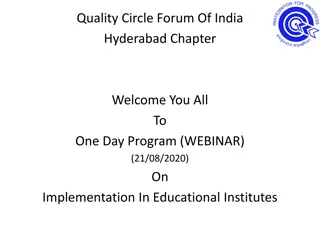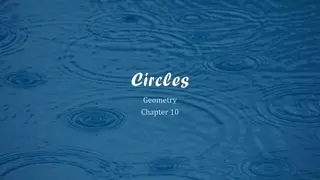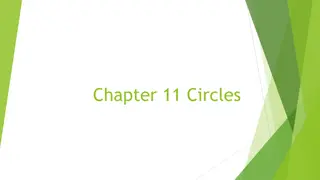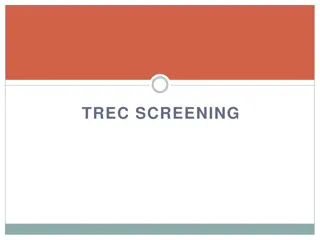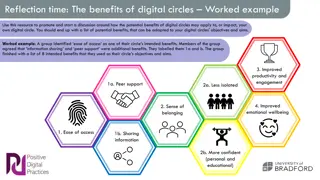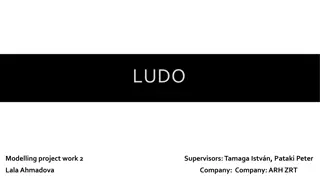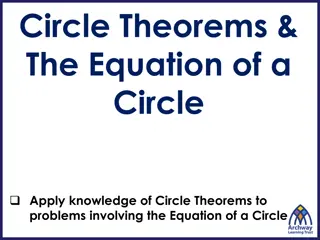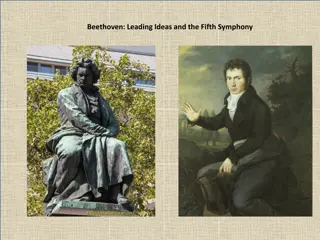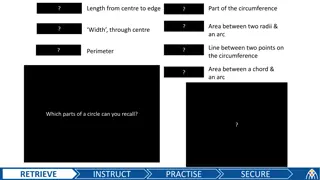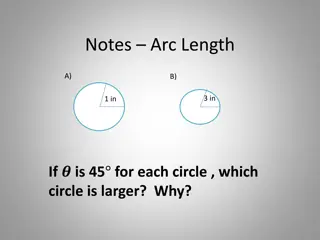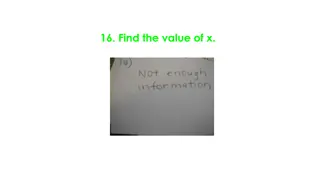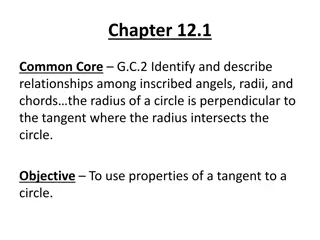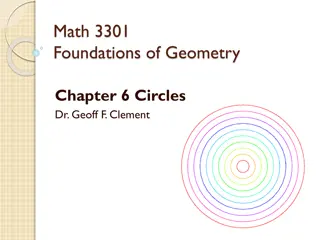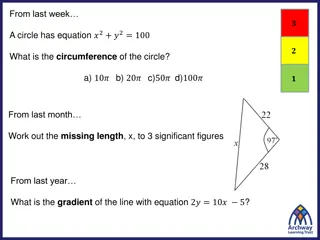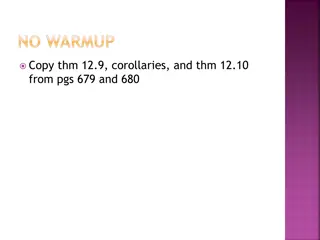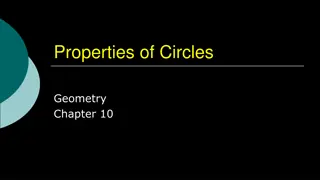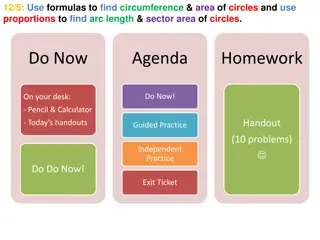Solution Circles
Solution Circles, a collaborative problem-solving approach, involve group discussions to generate solutions for various issues. Participants take turns presenting problems and brainstorming creative solutions within time limits. Roles like presenter, facilitator, timekeeper, and note-taker help ensure smooth functioning of the process.
Download Presentation

Please find below an Image/Link to download the presentation.
The content on the website is provided AS IS for your information and personal use only. It may not be sold, licensed, or shared on other websites without obtaining consent from the author.If you encounter any issues during the download, it is possible that the publisher has removed the file from their server.
You are allowed to download the files provided on this website for personal or commercial use, subject to the condition that they are used lawfully. All files are the property of their respective owners.
The content on the website is provided AS IS for your information and personal use only. It may not be sold, licensed, or shared on other websites without obtaining consent from the author.
E N D
Presentation Transcript
Solution Circles Dr Lucy Ball Senior Practitioner Educational Psychologist, Merton Kim Bulman Assistant Head Teacher & Behaviour Lead, Perseid School
Overview What are Solution Circles A Case Study Wider Applications 2
What is a Solution Circle? A solution circle (Forrest & Pearpoint, 1996) aims to help staff discuss school issues as a group, and to generate solutions. It is effective in getting problem in any aspect of work life. Solution circles are capacity It assumes and demonstrates within the work place have the capacity to help, if asked unstuck from a tools of community that people 4
What is a Solution Circle? Getting unstuck A creative problem solving tool 5
How does it work? Each circle takes no more than thirty minutes It involves around listen, discuss and collaborate around a focus issue brought to the group by a participant 8 people who 6
What problems can be discussed? Anything 7
What are the roles in a Solution Circle? Presenter of the problem (focus person) Facilitator - Time keeper Note taker Brainstorm team 8
STEP 1 6 Minutes The presenter of the problem takes 6 minutes to outline the problem This can be anything that they feel stuck with The timekeeper keeps time and make sure no one interrupts The recorder takes notes Everyone else listens If the problem presenter stops talking, everyone else stays silent until the 6 minutes pass This is vital! The problem presenter gets 6 uninterrupted minutes 9
STEP 2 6 Minutes This is a brainstorm Everyone chimes in with ideas and creative solutions to the problem presented It is not a time to clarify the problem or to ask questions The facilitator must make discussion Everyone gets a chance to give their brilliant ideas No one is allowed to dominate The problem presenter listens - without interrupting They must not talk or respond sure this is a team 10
STEP 3 6 Minutes The group now have a discussion led by the problem presenter The problem presenter may wish to discuss some of the suggestions The wider group may have some questions for the problem presenter This is time to explore and clarify the problem Focus on the positive points only, not what cannot be done 11
STEP 4 6 Minutes THE FIRST STEP The focus person, with the support of the group, decides on first steps that are doable within the next 3 days At least ONE step should be initiated within 24 hours This is critical Research shows that unless a first step is taken almost immediately, people do not get out of their ruts . A person from the group volunteers to see the person within 3 days and check if they took their first step. 12
And to finish. Finally the group does a round of words to describe the experience and the recorder gives the record to the focus person. 13
A CASE STUDY 14
Alliyah Diagnosis ASD / SLD History of periods of distress Related image Staff worries Sensory regulation difficulties Family context Health Care needs 15
Observed Changes Biting and scratching staff Hyper-vigilant and unsettled Significant decrease in communication Related image Decrease in emotional well- being Disengagement in learning 16
Other Key Information Input Possible Reasons Possible Antecedents Professional Input Related image Video Interactive Guidance (EP) Parental separation Living between two houses Additional TA support Staff and group changes CAMHS Medical Reasons Occupational Therapy Inclusion on schools Behaviour Intervention Group External Behaviour Specialist consultancy Team Around the Child Meeting Anxiety related to changes Updated EP advice for EHCP 17
The Solution Circle Educational Psychologist Positive Behaviour Support Lead Level 1 Teaching Assistant Related image Level 1 Teaching Assistant Teacher Level 1 Teaching Assistant Teacher Level 3 Teaching Assistant 18
The Solution Focus Solution Focused Strategy Concern Reported Outcome This initially worked well and for a period of time, presenting as more settled arrival to school. I understand that there have exceptions to this which coincided with Alliyah not being allowed to have an iPad on the bus. Alliyah was on Alliyah can present as unsettled during her morning transition when she first arrives in school. Alliyah to have a timetable on her bus which outlines her transition into school. been some Related image School staff are not always of Alliyah s morning routine (e.g. whether she has seen both mum and dad) and it would be helpful to be informed so as to explore whether any patterns could be found which relate presentation in school. Parents boxes to indicate how Alliyah has slept, eaten and whether he has seen Mum or Dad or both in the mornings (as week to week). to complete tick This has been completed but as yet there does not appear to be any obvious patterns linking into changes in Alliyah s presentation. breakfast to Alliyah s this varies All Alliyah will use a consistent and staged approach to re- engaging with her, recording outcomes for reflection. adults working with At times, Alliyah can withdraw from learning activities (including preferred) and withdraw from all interactions, showing a variable adults attempt to interact with her. This has worked well. Staff have reported that they are able to reengage with quickly. Alliyah more response when 19
Staff Feedback Teacher behaviours (biting and scratching) have not been shown over the past few weeks. I think the solution circle helped make sure that all of the staff working with her were following the methods in place and understood in detail why we were doing them and agreed with them. I think it helped support the team of people working with Alliyah and made us all on the same page. It allowed everyone to bring up any concerns or opinions they had in regards to what was working and was not working. It allowed all staff to share their thoughts and opinions on if the methods would work- it was not one persons decisions that others had to follow. It allowed staff with different knowledge together which highlighted methods we hadn't already implemented. It removed the pressure off of one person to come up with a solution and united the team. The way it was set up with the time periods allowed a very structured conversation and kept us on track. experiences to pool their 20
Staff Feedback Teaching Assistant I found it really useful, especially the way you have time to think in silence about what was said. It gives you time to think of ideas when previously you can t think of anything else to do. I think the things we put in place for Alliyah have helped her, and helped to bring her back to the Alliyah we all know. We should definitely use this in the future for Alliyah and other children that we are at a loss at what to do next to help them. positive from me. It s definitely a 21
Staff Feedback Teaching Assistant I in Solution Circles It has been a great experience to have taken part. The Solution Circles provided an participants to contribute with and provide many constructive and useful information, suggestions and ideas about Alliyah in order to find and agree best possible strategies to move forward with which could help and support Alliyah. am very grateful to have been asked to participate excellent opportunity for all Solutions Circles strategy has been very successful and helped Alliyah so much. Her behaviour has improved hugely and significantly. As a result, she is able to participate in many activities during school day, to learn, interact and have overall positive experience while being at school. I really hope that Solution Circles strategy continues to be used in our school and I would like to be part of it again. 22
Staff Feedback Summary Positives Team participation in decision making process Shared ownership of the problem solving process Consistency of input and strategies across the team Focused discussion using a set time frame and clearly defined roles means that controlled by one person Positive outcome for the pupil Opportunity to pool ideas using the experience of different staff with different roles within the school Offered a level playing field the conversation is not 23
Research Outcomes (Grahamslaw & Henson, 2015) The identity rather than being a collection of individuals The circle process aims for a ripple effect whereby the impact experienced beyond the discussions that take place within the circle The circle provides social support to those taking part in a safe climate circle creates a cohesive group of the group is 25
Impact on Staff Wellbeing (Staff Support Groups) Staff feel supported / value the support of colleagues (Creese et al., 2000; Jackson, 2005; Wilson & Newton, 2006) Staff report feeling discussing children challenging (Jackson, 2005) less they stressed were after finding 26
Impact on Staff Wellbeing (Solution Circles) Brown and Henderson (2012) Opportunities for people to talk and listen Staff became more aware of the difficulties colleagues were experiencing A platform for sharing and encouraging an atmosphere of team work 27
Other Examples of Use Parent and staff circle Staff wellbeing circle Whole class focus Leadership focus ...the possibilities are endless 28
Keys to Success Shared aims and ethos Relationships Belief that small changes can ripple 29
Making it Sustainable Time allocation Embedding the approach Training key members of staff to become facilitators Skillset Neutral perspective 30
References Brown, E., & Henderson, L. (2012). Promoting staff support in schools: Solution Circles. Educational Psychology in Practice, 28(2), 177-186. Creese, A., Norwich, B., & Daniels, H. (2000). Evaluating teacher support teams in secondary schools: Supporting teachers for SEN and other needs. Research Papers in Education, 15, 307-324. Forrest, M., & Pearpoint, J. (1996). Solution circle: Getting unstuck a creative problem solving tool. Retrieved from: https://www.unclusion.com/ttsolutioncircle.html Grahamslaw, L., & Henson, L.H. (2015). Solving problems through circles. Educational Psychology in Practice, 31(2), 111-126. Jackson, E. (2005) developing observation skills in school settings: The importance and impact of work discussion groups for staff. Infant Observations, 8, 5-17. Wilson, D., & Newton, C. (2006). Circles of adults. A team approach to problem solving around challenging behaviour and emotional needs. Nottingham: Inclusive Solutions UK Ltd. 31
Regional SEND Lead Contact Information and Download Links
1 National Director Regional SEND Leadership 2 National SEND Leaders 8 Regions 16 Deputy Regional SEND Leads 8 Regional SEND Leads
Find your region The Regions are based on the boundaries used by the Regional Schools Commissioner areas. You can find out which region your local authority comes under here: https://www.sendgateway.org.uk/whole-school-send/regions/
National SEND Leaders Simon Knight simon@wholeschoolsend.com @SimonKnight100 Malcolm Reeve malcolm@wholeschoolsend.com @Malcolm_Reeve
The North (NORTH) Rachel Hargreaves RSL.NORTH@wholeschoolsend.com Dominic Wall DRSL.NORTH@wholeschoolsend.com Alistair Crawford DRSL2.NORTH@wholeschoolsend.com Twitter: @WSSNorth
Lancashire and West Yorkshire (LWY) Angela Holdsworth RSL.LWY@wholeschoolsend.com Lidia Gardner DRSL.LWY@wholeschoolsend.com Nicole Dempsey DRSL2.LWY@wholeschoolsend.com Twitter: @WSSLancsWY
East Midlands, South Yorkshire and the Humber (EMSYH) Judith Smith RSL.EMSYH@wholeschoolsend.com Jane Starbuck DRSL.EMSYH@wholeschoolsend.com Emily Walker DRSL2.EMSYH@wholeschoolsend.com Twitter: @WSSemsyhumber
West Midlands (WM) Nicola Davis RSL.WM@wholeschoolsend.com Amanda Wright DRSL.WM@wholeschoolsend.com Conrad Bourne DRSL2.WM@wholeschoolsend.com Twitter: @WSSWestMids
East of England and North East London (ENELON) Michelle Unstead DRSL2.ENELON@wholeschoolsend.com Heba Al-Jayoosi DRSL3.ENELON@wholeschoolsend.com Clare Belli DRSL.ENELON@wholeschoolsend.com Twitter: @WSSEastNELondon
South Central England and North West London (SCNWLON) Katherine Walsh RSL.SCNWLON@wholeschoolsend.com Matt McArthur DRSL.SCNWLON@wholeschoolsend.com Rebecca Jones DRSL2.SCNWLON@wholeschoolsend.com Twitter: @WSSscnwlon
South East England and South London (SESLON) Amelie Thompson RSL.SESLON@wholeschoolsend.com Tina Harvey DRSL.SESLON@wholeschoolsend.com Kerry Greene DRSL2.SESLON@wholeschoolsend.com Twitter: @WSSSESLondon
South West (SW) Erica Wolstenholme RSL.SW@wholeschoolsend.com Alison Betts DRSL.SW@wholeschoolsend.com Emma Vyvyan DRSL2.SW@wholeschoolsend.com Twitter: @WSSSouthWest
Whole School SEND Resources The Review Guides can be downloaded here: https://www.sendgateway.org.uk/whole-school-send/find-wss-resources/ The SENCO Induction Pack can be downloaded here: https://www.sendgateway.org.uk/whole-school-send/sencos-area/ The Condition-Specific Videos can be viewed here: https://www.sendgateway.org.uk/whole-school-send/find-wss-resources/nqt- videos.html
Recordings You can find recordings of our past webinars on our YouTube channel. Subscribe here to keep updated: www.youtube.com/c/WholeSchoolSEND
Please get in touch if you are struggling to locate any of the resources from this session info@wholeschoolsend.com
Thank you for attending! Join the Community of Practice: https://www.sendgateway.org. uk/whole-school-send/join- our-community-of- practice.html Sendgateway.org.uk Nasen.org.uk @wholeschoolSEND @nasen_org
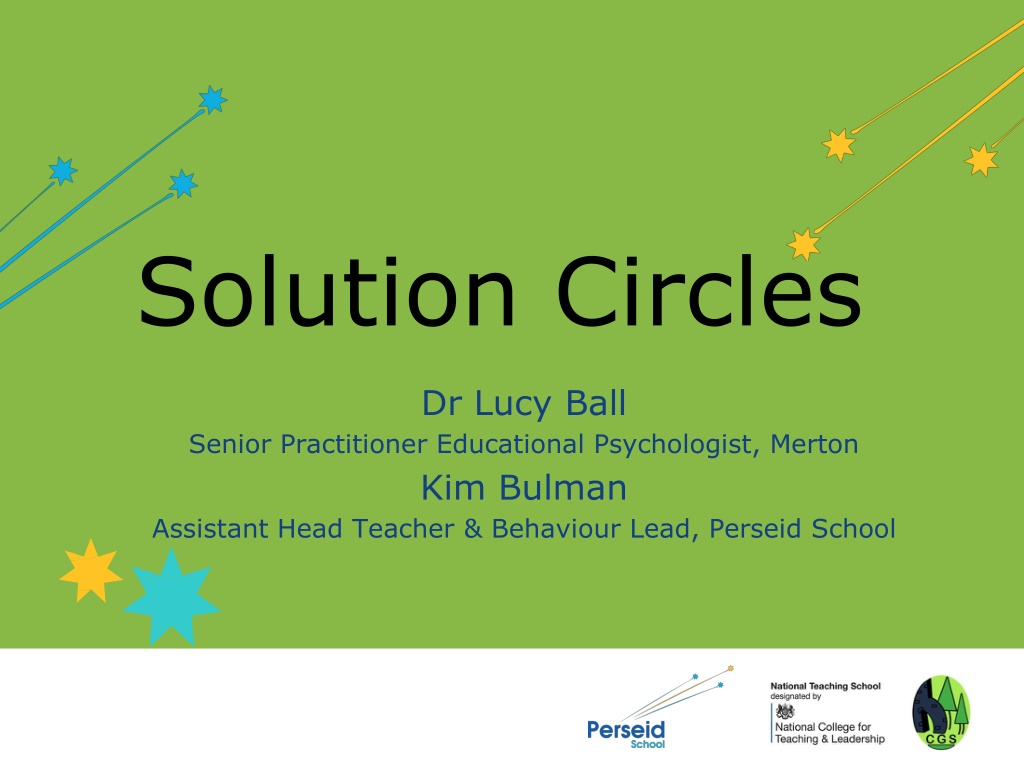
 undefined
undefined






